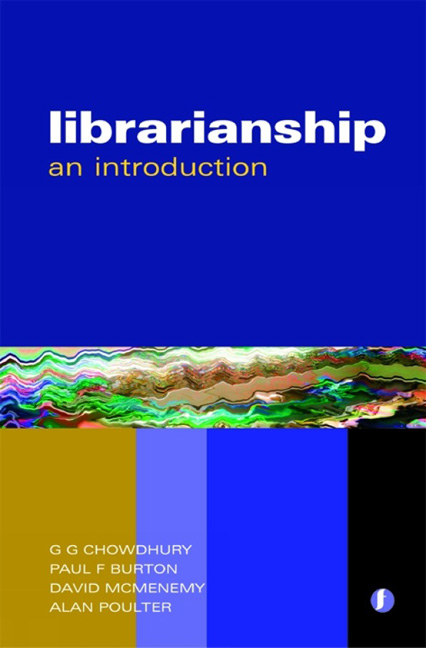Book contents
- Frontmatter
- Contents
- Preface
- Acknowledgements
- 1 Introduction
- Part 1 Libraries and information services: evolution or revolution?
- Part 2 Library and information resources and services
- Part 3 Information organization and access
- Part 4 Library and information users and society
- Part 5 Library technologies
- Part 6 Management and marketing in libraries
- Part 7 Education and research in librarianship
- Epilogue
- Glossary
- Resource list
- Index
1 - Introduction
Published online by Cambridge University Press: 08 June 2018
- Frontmatter
- Contents
- Preface
- Acknowledgements
- 1 Introduction
- Part 1 Libraries and information services: evolution or revolution?
- Part 2 Library and information resources and services
- Part 3 Information organization and access
- Part 4 Library and information users and society
- Part 5 Library technologies
- Part 6 Management and marketing in libraries
- Part 7 Education and research in librarianship
- Epilogue
- Glossary
- Resource list
- Index
Summary
This chapter provides an introduction to librarianship by defining the term and then providing a quick history of the development of libraries. It then briefly discusses the philosophy of librarianship, and lists the various technological developments that have influenced libraries and library and information services over the past. Finally an outline of the book is provided, with an indication of the various topics covered. By the end of this chapter, the reader should have an understanding of the concepts of the library and librarianship and the principles governing the subject and the profession.
Libraries
In the strict sense of the term, a library is a collection of materials organized for use (Feather and Sturges, 1997, 254). However, this is a very narrow definition of the term, and does not reflect the major characteristics of a library. The usage of the word in English, which derives from the Latin word ‘liber’, meaning book, has been traced back to 1374 by the Oxford English Dictionary (1989), which quotes Chaucer as discussing a ‘lybrarye aparayled and wrowht with yuory and with glas’. This was in the context of a private library owned by a gentleman, therefore not the publicly accessible institution we all know today. In terms of a public building that was defined as such, the OED quotes the use of the term c.1449 in relation to the library of a religious institution, and 1530 in terms of a library available in the ‘Gyldehall’ in London. These libraries were ‘public’ in terms of not being the library of an individual person, but they were not so in terms of the concept of the free, communal library we would identify with today, which came to prominence with the public library movement of the 1840s.
Various other definitions of the word library exist. In the most common usage of the term, a library denotes a physical space, a building, with shelves and so on, containing a number of books and other reading materials that have been organized for easy access and use. However, ‘library as a place of reading’ is not a complete definition of the term either, because it omits the various other activities that take place within a library, as well as the roles played by a library in human life and society in general.
- Type
- Chapter
- Information
- LibrarianshipAn introduction, pp. 1 - 12Publisher: FacetPrint publication year: 2007

